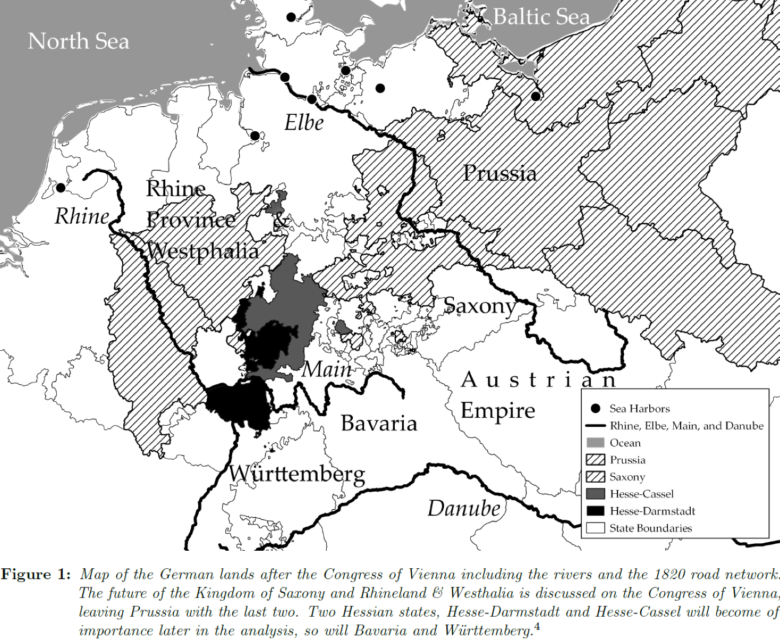Forgotten Weapons
Published on 13 Apr 2019This Bren is lot #1013 at Morphy’s April 2019 auction:
https://www.forgottenweapons.com/shoo…The Bren gun is widely regarded as one of the best light machine guns ever built, but that reputation is based on the British .303 caliber version. How does the design perform in 8mm Mauser? Today I am going to find out, using one of the John Inglis “sterile” 8mm Brens.
http://www.patreon.com/ForgottenWeapons
Cool Forgotten Weapons merch! http://shop.bbtv.com/collections/forg…
Contact:
Forgotten Weapons
PO Box 87647
Tucson, AZ 85754
April 14, 2019
Shooting the Inglis 8mm Bren Gun
British diplomatic blunders in history – German unification
An interesting article in Vox, suggesting that the gradual unification of all the German principalities, electorates, duchies, counties, bishoprics, free cities, and miscellaneous other semi-independent bits and bobs of the Holy Roman Empire was not inevitable and that — absent British blundering after the Napoleonic wars — it would have produced a very different 20th century:

The Holy Roman Empire in 1789, before Napoleon “rationalized” hundreds of smaller entities into the Confederation of the Rhine.
Image from Wikimedia Commons.
The boundaries of states are the heart of many recent debates, be it the European refugee crisis, the Transatlantic Trade and Investment Partnership (TTIP), or Brexit (Snower and Langhammer 2019). After decades of stability, today we are again seeing heated discussions about the shape and extent of political borders. Clearly, borders are neither naturally given nor random. In Europe and elsewhere, the current state borders have been formed and changed over centuries, sometimes peacefully, often in bloody wars. In Huning and Wolf (2019), we look at the formation of the German nation state led by Prussia and trace it back to a change in borders decided at the Congress of Vienna in 1814/15.
In a nutshell, we have two findings:
- First, the geographic position of a state can be a crucial factor for institutional change and development.
- Second, the formation of the German Zollverein in 1834 under Prussian leadership was a truly European story, involving Britain, the Russian Empire, and the Belgian revolution of 1830/31. We show in particular that the Zollverein formed as an unintended consequence of Britain’s intervention in 1814/15 to push back Russian influence over Europe.
In theory, why would the geographic position of a state relative to that of other states matter? Intuitively, it should matter as long as the costs of trade and factor flows depend on their routes. If a large share of my trade has to pass the territory of one or several neighbours, my trade and trade policy will depend on the trade policy of my neighbours. Moreover, if tariffs are levied not only on imports but also on transit trade, as was general practice until the Barcelona Statute of 1921 (Uprety 2006), policymakers face the problem of multiple marginalisation, which is well known from the literature on supply chains. In our work, we provide a simple theoretical framework (in partial equilibrium) to show how the location of a revenue maximising state planner will affect its ability to set tariffs. Some states can increase their tariff revenue at the expense of their hinterland. Next, we show that a customs union can be beneficial for a group of states exactly because it solves the problem of multiple marginalisation.
A major challenge to testing our idea empirically is that a state’s political boundaries (and hence its location) do not change very often, and if they do, the change is unlikely to be unrelated to trade or factor flows. However, the formation of the German Zollverein in 1834 can be considered as a quasi-experiment. Let us briefly revisit this historical episode. At the end of the Napoleonic wars of 1792-1814/15, only Russia and the UK were left as major military powers. Habsburg, Prussia, and the defeated France attempted to consolidate their positions at the expense of the many smaller states that had just about survived the wars, notably the former allies of Napoleon such as Saxony and Poland. Overall, the negotiations at the Congress of Vienna in 1814 were dominated by military-strategic considerations between the two great powers. Russia wanted to expand westwards, Prussia was desperate to annex the populous Kingdom of Saxony, which bordered Prussia in the south and would create a large and coherent territory. To this end, Prussia was willing to give up not only her Polish territories to Russia, but also her positions and claims on the Rhineland (Müller 1986). This met stiff resistance from Britain, joined by Habsburg and France, which feared a new Russian hegemony on the continent – the ‘Polish Saxon question’. After weeks of diplomatic struggle, the outcome was a division of Saxony, another division of Poland and Prussia being established as the “warden of the German gate against France” (Clapham 1921: 98). Figure 1 shows the result of these negotiations.
H/T to Continental Telegraph for the link.
The Invasion of Norway and Denmark – WW2 – 033 – April 13 1940
World War Two
Published on 13 Apr 2019This week, the Phoney War seems to come to an end when Germany invades Denmark and Norway. The Allies seek confrontation with Germany in the hope to at least deny them full access to the Swedish iron mines. Nevertheless, the Germans are prepared and have been planning this for weeks. It looks like it will cost a lot to put a stop to it.
Join us on Patreon: https://www.patreon.com/TimeGhostHistory
Or join The TimeGhost Army directly at: https://timeghost.tvFollow WW2 day by day on Instagram @World_war_two_realtime https://www.instagram.com/world_war_t…
Join our Discord Server: https://discord.gg/D6D2aYN.
Between 2 Wars: https://www.youtube.com/playlist?list…
Source list: http://bit.ly/WW2sourcesWritten and Hosted by: Indy Neidell
Produced and Directed by: Spartacus Olsson and Astrid Deinhard
Executive Producers: Bodo Rittenauer, Astrid Deinhard, Indy Neidell, Spartacus Olsson
Creative Producer: Joram Appel
Research by: Indy Neidell
Edited by: Iryna Dulka
Map animations: EastoryColorisations by Norman Stewart and JuliusJaa (https://www.flickr.com/photos/juliusjaa/)
Eastory’s channel: https://www.youtube.com/channel/UCEly…
Archive by Screenocean/Reuters https://www.screenocean.comSources:
Riksarkivet
File reference: RA/PA-1209/U/Uj/L0203
Author: unknown
File reference: RA/PA-1209/U/Uj/L0203
Author: unknownA TimeGhost chronological documentary produced by OnLion Entertainment GmbH.
From the comments:
World War Two
1 hour ago
Hey all! The Phoney war is over, and although we have learned in the last months that it wasn’t as uneventful as is generally believed, the war really takes off here. While this is going live, we are in France to film future events, which I won’t spoil in this video. If you don’t mind too much, do check out our road trip vlogs (the many specials we shot here will have to be edited and will be published over the spring). We have seen very interesting things and we will challenge many misconceptions and myths about the upcoming events of World War Two. Thank you all for your ongoing support!Cheers,
Joram
Model 1927 Thompson Semi Automatic Carbine
Forgotten Weapons
Published on 13 Mar 2019Note: Rock Island has not yet posted the catalog for this auction – I will replace this note with a link when they do.
http://www.patreon.com/ForgottenWeapons
Cool Forgotten Weapons merch! http://shop.bbtv.com/collections/forg…
One of the rarest versions of the Thompsons Submachine Gun is the Model of 1927 Thompson Semi Automatic Carbine. These were regular 1921 machine guns that had their fire control groups slightly modified to only firm in semiauto and their receivers remarks to show Model 1927 instead of 1921. The rationale was a number of requests Auto Ordnance received from potential customers who wanted the look of a Thompson, but not an actual machine gun – mostly police and prison agencies that did not want to entrust their officers will fully automatic arms. Only about 100-150 1927 model guns were sold (and there is no specific serial range, they were simple converted one at a time as ordered). Of that very small number, only a very small percentage survive intact today, as most were converted back to fully automatic by later owners. Note that because the receiver is basically identical to a standard Thompson SMG receiver, these are considered machine guns under US law despite being factory semiauto carbines. However, this does mean that they can be legally converted to fully automatic (as, in fact, most have been).
Contact:
Forgotten Weapons
PO Box 87647
Tucson, AZ 85754




